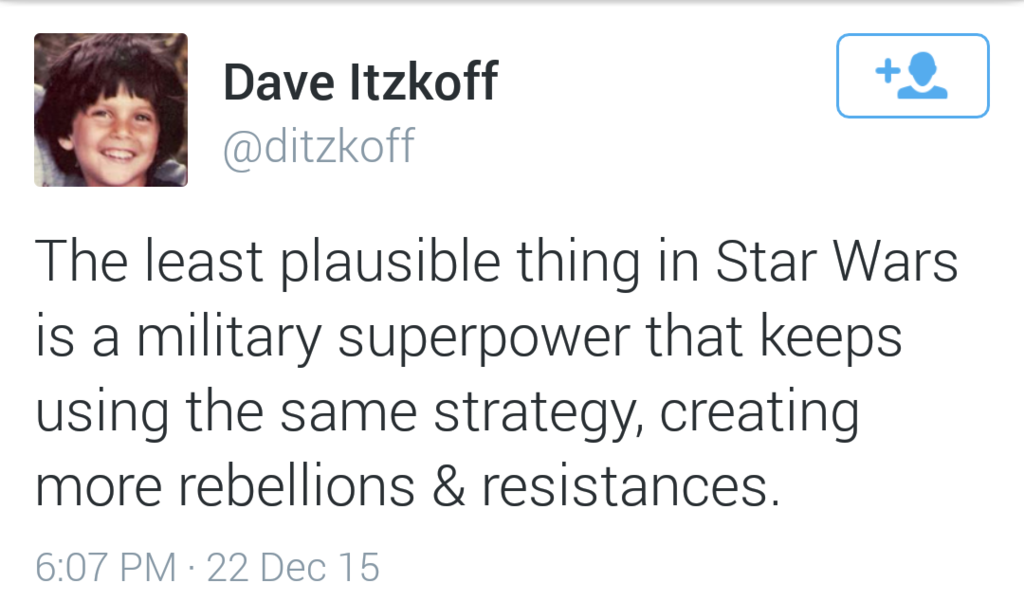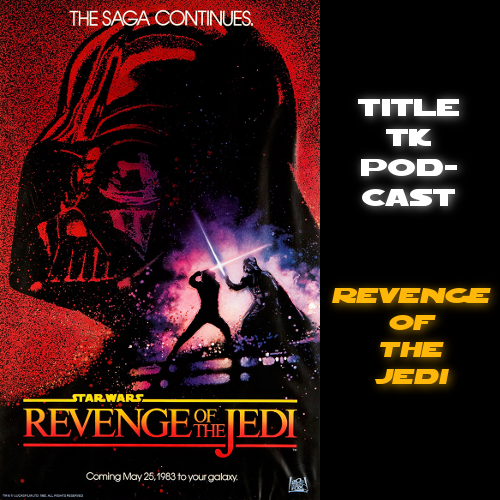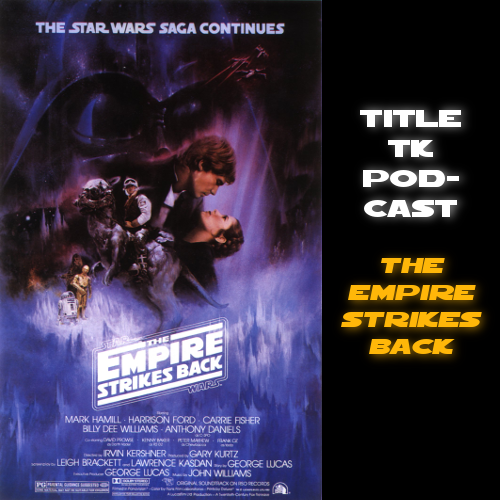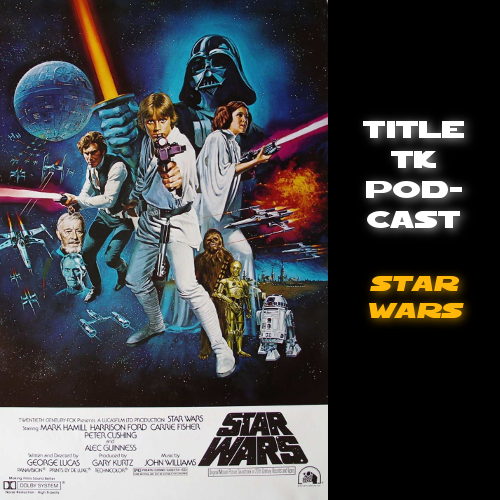The following isn't really a review at all. It starts as a review of Ready Player One by Ernest Cline, but that's just a jumping-off point to discuss the nature of nostalgia porn in general, specifically as it relates to recent film culture. I wrote it as a blog entry and thought I'd post it here, see if it has any merit. Writing it was a cathartic experience, as it basically sums up my extreme frustration with nostalgia porn in general but also touches on my hope for franchise films as they relate to art.
Also, Ready Player One spoilers--that wouldn't fit in the title. 
* * * *
When did we, as a culture, become so scared of stories that matter?
I ask this having recently finished Ernest Cline’s novel Ready Player One, a book that is apparently widely beloved. And certainly wildly successful—as of this writing it has over 200,000 reviews on Goodreads, was placed in the Top 10 lists of multiple publications the year it was printed, and is being adapted into a feature film directed by none other than Steven Spielberg. All of this inordinately depresses me, because the book is, not to put too fine a point on it, fucking awful.
Ready Player One tells the story of a dystopian future in which climate change has ravaged the planet, economic inequality runs rampant, and people are living in stacks of mobile homes supported by steel scaffolding. Rest assured, however, readers—none of this is explored with any substance whatsoever. Rather, it forms the necessary background for the book’s true concern: the 1980s. See, the future’s resident eccentric billionaire, James Halliday, has created a massive virtual reality/MMORPG called OASIS, an escapist realm that is stuffed to the gills with references to his favorite movies, video games, books, and music, most of which come from the 80s. When Halliday dies, he reveals that his entire 200 billion dollar fortune will be given to whichever OASIS player can use their knowledge of 80s trivia to complete a massive quest and pass through three gates to a final challenge. Thus, most of the world is now living almost entirely in their computers, obsessed with memorizing details of Halliday’s favorite pop cultural artifacts. Our Hero, Wade, is himself one of these searchers, and, in a plot arc that holds pretty much no surprises at all, manages to use his 80s knowledge to beat the odds, win the fortune, and—of course—get the Manic Pixie Dream Girl with absolutely no personal growth on his part.
I don’t say that Ready Player One is fucking awful because it’s poorly written, although it is. The prose is riddled with the voiceless “I did X, she did Y, the vase looked like V” syntax that plagues the YA market, none of the characters’ voices are distinguishable from each other, and the plot is painfully predictable. No, I say it’s fucking awful because it’s the epitome of a tyranny that has our current popular culture throttled in its grip—cheap nostalgia.
In his famous essay “E Unibus Pluram: Television and U. S. Fiction”, David Foster Wallace lamented what he saw as the slow death of popular culture due to cheap irony. It’s important to clarify that DFW didn’t object to all irony—he viewed it as a crucial component of effective satire. However, in his words:
Sarcasm, parody, absurdism and irony are great ways to strip off stuff’s mask and show the unpleasant reality behind it. The problem is that once the rules of art are debunked, and once the unpleasant realities the irony diagnoses are revealed and diagnosed, then what do we do? Irony’s useful for debunking illusions, but most of the illusion-debunking in the U.S. has now been done and redone. Once everybody knows that equality of opportunity is bunk and Mike Brady’s bunk and Just Say No is bunk, now what do we do? All we seem to want to do is keep ridiculing the stuff. Postmodern irony and cynicism’s become an end in itself, a measure of hip sophistication and literary savvy. Few artists dare to try to talk about ways of working toward redeeming what’s wrong, because they’ll look sentimental and naive to all the weary ironists. Irony’s gone from liberating to enslaving. There’s some great essay somewhere that has a line about irony being the song of the prisoner who’s come to love his cage.
Similarly, not all nostalgia is bad. What’s bad is the kind of nostalgia that runs rampant through our culture in general and Ready Player One in particular: the kind that has nothing to say about the things it’s nostalgic for, and more importantly what those nostalgic objects stand for in their own right. Here’s a representative sample of the book’s engagement with a cultural artifact:
“I was just reading this great piece on Ewoks: The Battle for Endor.”
“Made for TV. Released in 1985,” I recited. Star Wars trivia was one of my specialties. “Total garbage. A real low point in the history of the Wars.”
“Says you, assface. It has some great moments.”
“No,” I said, shaking my head. “It doesn’t. It’s even worse than that first Ewok flick, Caravan of Courage. They shoulda called it Caravan of Suck.”
The first thing that’s wrong with this exchange is that there’s absolutely nothing real about it. Two actual fans of a property would never stop in the middle of a conversation to name-check the movie’s name, release date, and critical reception—this is a full half dozen lines of dialogue that serve no purpose except to assure the audience that if they don’t get it, it’s okay, the book is going to explain it all to them. This, however, could be forgiven—it’s bad writing, sure, but this kind of as-you-know-speak is all too common in any sort of fiction these days, and has been for all eternity. The larger problem is that this is the deepest that any of the book’s copious references goes. In real life, while the two friends may not have begun a deep critical introspection on the meaning of The Battle for Endor, they would at least bicker as to the precise reasons whether or not it’s a work of artistic merit. Here, their conversation serves no purpose other than to wink at the reader. Hey, remember that obscure Star Wars TV movie? It sucked, right? Ha, okay, moving on. More often than not, it’s even shallower than this; Cline simply uses pop culture references as set dressing, saying that this vehicle looks exactly like the DeLorean or that enemy is dressed like a Cylon from Battlestar Galactica ad nauseum. There’s not a single original description that I can think of offhand.
As much as I despised Ready Player One in particular, this is a problem that is far from limited to one particular novel. Our current film landscape is saturated with it. Quick, what do Indiana Jones and the Kingdom of the Crystal Skull, Terminator: Genysis, A Good Day to Die Hard, and Star Trek Into Darkness have in common? A complete lack of respect for their source material. They and other franchise-zombie cash grabs like them don’t even attempt to understand what made their predecessors great movies to begin with, or to take the values and ideas presented by those predecessors and examine them in a new light. Rather than attempting to make their own artistic, philosophical, or cinematic statements—or, hell, even just to make their own memorable moments—they’re replete with nothing but nods to past movies. Hey, remember when Indy was scared of snakes in the first movie? He’s scared of snakes again! Ha, okay, moving on. Hey, remember when Arnie said “I’ll be back”? Let’s repeat it completely out of context for the canned laughter! Ha, moving on. Hey, remember when Spock had a meaningful, thematically resonant death in The Wrath of Khan? Let’s restage that death down to the camera angles, only switch Kirk and Spock’s positions. And then bring Kirk back, because we can’t kill our box office draw. Moving on. Hey, remember when...
And, like a copy of a copy of a copy, the life drains further and further away with each successive installment.
It seems idiotic. Why would anyone want to spend ten dollars to see reference after cheap reference to a great work of art when they could simply just go back to the great work of art itself? Unfortunately it works damn near every time. Crystal Skull and Into Darkness were each the highest-grossing films of their respective franchises. A Good Day to Die Hard tripled its production budget. Genysis didn’t do as well as expected, but still grossed a cool $440 million and has sequels on the way. Our third Spider-Man series in eight years is on the way. And, of course, the alarmingly cynical Jurassic World just grossed 1.5 billion dollars, placing it in the top five highest-grossing features of all time.
We should want better. As a culture, as filmgoers, as readers. But we don’t seem to particularly care. And the result? A decade full of stagnant, tired ghosts of Way Back When that, in another decade, will be worth absolutely nothing because they didn’t bother to say anything themselves.
* * * *
“Which came first, Star Wars or the cynicism?” asks Chris Hanel in his film The Formula. It’s a question that I had on my mind throughout my read of Ready Player One. Has our culture always been this plastic, this shallow, or has franchise growth genuinely lessened our culture’s desire to interact with art?
The Formula, released thirteen years ago, is prescient in this way about much of fan culture in general and Star Wars fan culture in particular. It’s an exercise in metafiction—a fan film about a group of four friends making a fan film. Hanel’s character, Tom, has been utterly embittered by the disappointment that was The Phantom Menace, and is attempting to work through his issues by making his own lightsaber duel in his backyard. Unfortunately, even this is tainted by his utter hatred for the thing he once loved. “Did I watch Star Wars because I was miserable?” he asks, “Or was I miserable because I watched Star Wars?” As the film progresses, Tom finds himself bankrupt from filming costs, alienated from his best friends, and transformed into a contemptible, embittered person. By the end of the film, he’s been brought around, realizing that his film is “only a movie” and through its completion purging himself of his hatred for Star Wars. But a throwaway reference to Attack of the Clones’ upcoming release is a subtle reminder that disillusionment may again be just around the corner.
Hanel’s film resonated intensely with me when I first saw it, and remains a work of art that I see quite a bit of myself in. Besides this, it’s a shining example of how a book like Ready Player One should be written. The Formula’s fifty-minute runtime is absolutely stuffed with references to pop culture—there’s a fight scene that’s a blatant homage to The Matrix, a shell-shocked Tom delivers a line-for-line recreation of Quint’s famous Indianapolis monologue (waiting for rescue whilst being devoured by sharks has been replaced with waiting in the rain for The Phantom Menace’s premiere), and of course bits and pieces of Star Wars and Star Trek mythology litter its script. But none of it feels cheap, or unearned. The reason for this is that Hanel understands Star Wars, understands its fans, and made a film that grew out of this understanding. It’s a film that delights in referencing its influences, and that delight is there because it’s not simply parroting them word for word. It’s turning them over in its hands, examining their cracks and fault lines and mechanisms, and attempting to say something new and meaningful about those bits and pieces rather than simply using them for a cheap laugh. To paraphrase the line that the film’s title is taken from, there’s a difference between mastering a form and plugging in a formula.
A similar instance of a pop-culture-laden piece of media becoming meaningful art in its own right is the rise of RedLetterMedia’s reviews of the Star Wars prequels. By the time the first of the reviews was released, The Phantom Menace had existed for a decade. Fandom still hadn’t healed. Indeed, it had gotten if anything even more toxic, endlessly wailing about various minutiae that existed in the movie as evidence of its “raping their childhood”. RedLetterMedia could have simply exploited this, posting a fifteen-minute rant about the stupidity of Jar-Jar Binks, the idiocy of Meatbeard, and so on and so forth. The video may very well have been popular, and would have pressed all the right buttons among prequel-haters. Instead, the reviewers strove for the same understanding that The Formula possesses—just why are these movies so reviled? What do their flaws say about art in general? And should we care?
The result was a masterpiece of criticism. “Mr. Plinkett”, the aged serial killer who delivers the reviews, uses the prequels to study film theory, story structure, and film’s effect on pop culture. His rants are carefully constructed, the videos that accompany them meticulously edited. And not a shred of pandering is present—there’s nary a mention of Jar-Jar Binks and other superficial problems. In crafting their reviews this way, RLM created works of art themselves. You don’t need to have watched the Star Wars prequels to be alternately stunned and uproarious at Plinkett’s incredibly black sense of humor, or to appreciate his insights into how movies work. The reviews stand on their own, because rather than simply repeating tired gags and talking points they determined to say something new about the property they analyze. And chances are, when no one remembers anything meaningful about Terminator Genysis or Star Trek Into Darkness, Mr. Plinkett will still be floating around the internet.
* * * *
Most franchise installments these days don’t follow the wisdom present in The Formula or the RedLetterMedia reviews. And they don’t need to—Jurassic World had nothing new or interesting to say and still succeeded beyond its makers' wildest dreams.
But. But.
It’s worth considering that the two biggest movie phenomena of the first decade of the 21st century were the Lord of the Rings trilogy and the Harry Potter series. Neither of these is an original work—both are adaptations of equally popular novels. Each grossed billions of dollars, but of course that isn’t a hallmark of art—as I said above, Jurassic World managed to make over half the money the Lord of the Rings trilogy did. More interesting is their staying power. It’s been almost fifteen years since The Fellowship of the Ring was released in theatres, and its pervasive cultural presence shows no signs of diminishing. The same applies to Harry Potter and the Philosopher’s Stone.
Obviously, the fact that both were based on pre-existing properties is a large reason for their success. But their staying power can’t be attributed to that. The reason that they have and will continue to endure as classic works of art long after most other franchise-based films have faded away is that they understand the foundations that they’re based on. That’s not to say they’re perfect adaptations—Potter in particular is often a pale shadow of the books it’s based on. However, each series ultimately reflects the qualities that are at the heart of its source material. The importance of love, and faith in one’s friends. The magic that can be found in other worlds. The knowledge that the triumph of Good over Evil is never quick, and never easy, but always worth fighting for. These films have meaning, and that is why they’ve endured.
That, I honestly believe, is why Star Wars: The Force Awakens is the most important film that will be released this year, or for a few years. Why the reaction to its trailers and posters and other bits of advance media have been absolutely massive. Why it’s already set to, in its opening weekend, obliterate any and all box office records. Part of it is that it’s based on a beloved pre-existing property, and Star Wars fans can and will endure anything that bears that name. But the part that goes beyond brand loyalty, that has people wildly excited rather than simply expectant, is that J. J. Abrams understands Star Wars.
It’s the film’s second teaser and theatrical trailer that have made this most plain. “The Force is strong in my family,” says a distant Luke Skywalker in the former. “My father has it. I have it. My sister has it. You have that power too.” And in the latter. . . “It’s true—all of it,” says Han Solo, looking worse the wear for the thirty-five years since we’ve last seen him. “The dark side, the Jedi. They’re real.” “The Force,” says a mysterious voice, “it’s calling to you. . .just let it in.”
This is what matters, ultimately. Not that Abrams has a visual sense for what Star Wars should look like, although he certainly does. Not that he’s gotten the old cast back, although God bless him for doing so. What matters is that he has an intuitive sense for what Star Wars is about. That anyone can be a hero, that redemption is beyond no one. That Good and Evil matter, and we are all fighting for them whether or not we wield a lightsaber. That the Force is indeed calling to us, whether that be metaphorical or literal. And that, in the end, the universe is at its most terrifying and most wonderful when seen through a child’s wonder. “What delights us?” These are what Abrams has said were the guiding words for putting together The Force Awakens. Not “What will bring a chuckle out of the audience opening night?” What delights us.
Franchise films needn’t be nostalgia porn. Nostalgia itself needn’t be artistically bankrupt. Critiques such as The Formula and the Plinkett reviews prove this. The rare well-crafted sequels or reboots, such as this year’s transcendent Mad Max: Fury Road prove this. Artistic homages such as Abrams’ own Super 8 prove this. And while it’s tempting fate to say so, I’m confident that Star Wars: The Force Awakens will prove it too. Bring on a fifth Pirates of the Caribbean film, a Jurassic World sequel, yet another Die Hard installment. They will suck, and they will be soulless, and it will depress me that they make money. But in the long run, our culture does recognize artistic merit, and meaningful stories. And it’s my firm belief that this will, eventually, be the case as regards the art of this decade, Ready Player fucking One be damned.
















